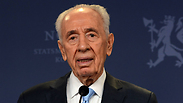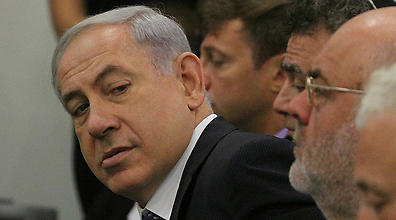
Post-Peres politics lack unifying leaders
As foreign threats against Israel decrease, politicians in the Jewish State will need to focus on social issues to avoid nationwide divide.
It’s not difficult to lose interest in an Israeli presidential race. Citizens do not directly vote on candidates as they do in parliamentary elections and the position is largely ceremonial; presidents generally use their position to forge friendly relations with foreign leaders while the prime minister wields head of state powers.
Yet, even though the office does not carry any actual political influence, campaigns for the presidency quickly devolve into publicity drives and behind-the-scenes disputes between faction members.

The brief but boisterous campaign will come to an end on June 10, when the presidential elections mark the end of an era - the retirement of Shimon Peres, the last remaining mastadon of Israel’s mythological formation.
Related Stories
- Shalom likely to drop out of presidential race
- Israel's presidential election to be held June 10
- Presidential election farce: Netanyahu's wife won again
The retirement of Peres from politics, after a career spanning seven decades, demands that citizens and politicians alike think long and hard about the legacy he leaves behind, and what direction the country should take in a post-Peres age.
When former prime minister Ariel Sharon was felled by a stroke in 2006, the 90-year-old political giant became the last publically active member of a generation of Zionists who shaped the clay of early-Israel with their bare hands.
The most seasoned politicians today are those like Prime Minister Benjamin Netanyahu.
Netanyahu’s crowd was born at the tail-end of World War II and that generation was the first to grow up in an independent, Jewish nation.
Such men were quickly infused with hawkish personalities and the brooding brutality needed to help Israel survive its early days, but even after a lifetime of service to the country, they lack the heroic status bestowed upon Peres and Sharon for proudly leading the idyllic struggle for independence and the right to fight against oppression.

Now Peres is leaving, and while no politician ever enjoys a 100 percent approval rating in any office, his long service and leadership in Israel’s most difficult times made him a trusted leader, one that could unify Israelis to follow him through hardship.
The coming years will make it blatantly clear how important the Peres generation had been for Israel, as increasing individualism on the left and blind support for anything religious on the right, are making Israel more polarized than ever.
Those in Tel Aviv aspire to European ideals, which are not plausible while West Bank settlers are subsidized, and those settling the West Bank strive to rebuild King David’s kingdom, which isn’t realistic while Tel Aviv pushes for modernization.
Netanyahu does his best to hold onto political power and keep both sides subdued in the status-quo, but he lacks the charisma to unify Israelis. His approval ratings have never peaked beyond 50 percent while his administration has made no progress in peace talks with the Palestinians, even as other important national issues remain unaddressed.
The heroic generation that led on the principles of the War of Independence gave Israelis unifying representatives to stand behind, especially when faced with military threats.
Today, the threat of extermination is becoming an inadequate and unfounded excuse to put aside domestic issues. Fear is no longer enough to unify a country with severe political and ethnic extremes.
What Israelis need is solid social progress. Without it, Netanyahu’s generation of hawkish survivalists, determined to paint every foreign nation as an enemy to Judaism, won’t be able to keep the lid on the left-right divide much longer.
Where’s the threat Mr. Netanyahu?
This new era marks the first time in Israel’s 66 years that the nation faces greater threats from within than without. This is partly due to the growing divide between Israelis and partly due to the decrease of any legitimate threat from abroad.
Egypt should be watched carefully, but the new regime taking form will most likely remain a tolerant, and possibly even profitable partner for Israel. Peace with Jordan is secure and the government there seems to have weathered the Arab Spring that swept many Arab regimes.
Syria won’t be able to pose a serious military threat to Israel for years to come - even after its civil war is finally resolved - and the weak Lebanese government would never purposefully risk a military conflict with Israel.
The Israel Defense Forces, namely the Israeli Air Force, has a well of experience and success to draw off of when dealing with rockets from Hezbollah, while Hamas is slowly becoming more of a legitimate political party and less of a terror threat in order to stay relevant in the face of blockades from Israel and Egypt.
Even in the scenario that a peace agreement was signed with the Palestinians based on the 1967 borders, Israel’s technological prowess and support from the US assure the IDF unparalleled military superiority to handle incoming threats.
A democracy obviously demands more than one voice. Right-leaning politicians need to be there to rein in leftists urging Israel to disband its military, and left-leaning politicians need to block attempts from the right to annex the West Bank and expel the Palestinians, but certain issues require Israelis to be unified - something that will only happen when Israelis rally around an effective, inspiring leader under a banner of social progress.
Voters may not be taking part in the upcoming presidential elections, but it will inevitably be up to them to drive Israel toward social progress and away from internal strife; none of the post-Peres leaders will make that decision for them.










